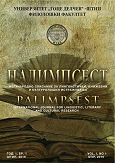MIDDLE DIATHESIS MARKING IN ENGLISH: EVIDENCE FROM MACEDONIAN TRANSLATION EQUIVALENTS
DOI:
https://doi.org/10.46763/PALIM24917015aAbstract
This paper explores English constructions featuring the verb get and the past participle, which cannot be classified as passive, along with their Macedonian translation equivalents. These constructions typically involve an affected subject referent with varying degrees of control over the predication. The aim of our research is to examine these English constructions, identify their Macedonian counterparts and elucidate their semantic properties. To achieve this, we compiled a corpus of 405 examples extracted from works by English authors and their Macedonian translations. Our analysis employs both qualitative and quantitative methods to explore the data. The findings from this research endeavor to clarify the status of English get+past participle verb forms lacking passive semantics.
Keywords: voice; diathesis; inchoative constructions; passive; contrastive analysis.


